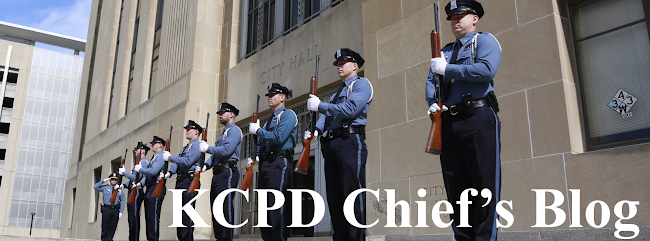Most people don’t realize the connection marijuana has to
violent crime in Kansas City. On Sept. 10, two men were murdered in their
apartment in south Kansas City. A dog was shot and killed, too. The men were
known to sell marijuana, and evidence at the homicide scene confirmed that.
Investigation has revealed the marijuana dealing was likely the motive of their
homicides. So far this year, 10 of our homicides have been directly motivated
by marijuana. The non-fatal shootings are even greater. Most of these
marijuana-related shootings start as robberies of marijuana or the money
connected to it.
The common argument is that this violence would cease if
marijuana were simply legalized. The data from states that have done so,
however, show just the opposite is happening. The Midwest High Intensity Drug
Trafficking Area (HIDTA) of the Office National Drug Control Policy issued a report
in March summarizing what has happened in states that have legalized
recreational marijuana for several years. These include California, Colorado,
Oregon and Washington. Some of our drug sergeants also spent time with police
in Denver and Aurora, Colorado, this summer to see what they’re doing so we can
prepare for medical marijuana coming to Missouri. I wanted to share some of the
common myths and facts about recreational marijuana from the HIDTA report and
what our detectives experienced.
MYTH: Crime will go
down if marijuana is legalized.
FACT: Colorado,
Oregon and Washington all experienced increases in violent crime and property
crime in the years following legalization. Recreational marijuana was legalized
in Colorado and Oregon in 2012. From 2012 to 2016, the number of homicides in
both Colorado and in Oregon increased by 41%. Washington legalized recreational
marijuana in 2014. By 2016, their homicides had increased by 248%.
Another crime has sprung up around legalized recreational
marijuana in these states: human trafficking. Between 2013 and 2016, Washington
saw a 600% increase in these cases. According to the HIDTA report, “Several marijuana-producing
states have reported cases of sexual exploitation, kidnapping, and forced labor
linked to marijuana grow (operations), particularly in California’s Emerald
Triangle region. Migrant workers that travel to the region to work in both
legal and illegal growing operations have experienced rape, human trafficking,
and other forms of abuse by marijuana growers.”
Reporter Alex Berenson gave a speech
outlining the impact of marijuana on mental health and violence. He reported,
“A 2012 paper in the Journal of Interpersonal Violence examined a
federal survey of more than 9,000 adolescents and found that marijuana use was
associated with a doubling of domestic violence; a 2017 paper in Social
Psychiatry and Psychiatric Epidemiology examined drivers of violence among
6,000 British and Chinese men and found that drug use—the drug nearly always
being cannabis—translated into a five-fold increase in violence.”
Our
sergeants who visited Colorado saw a family of Chinese nationals who had been
trafficked to oversee a large, illegal growing operation in the basement of a
$750,000 home in an affluent neighborhood. They learned this was common in that
area.
MYTH: Marijuana
legalization has no impact on intoxicated driving.
FACT: After
recreational marijuana was legalized in California, marijuana-related traffic
deaths increased 151%. Fatalities involving drivers who tested positive for
marijuana rose from 55 in 2013 to 138 in 2017. The
National Highway Traffic Safety Administration’s (NHTSA) Drug and Alcohol Crash
Risk Study found that marijuana users are 1.25 times more likely to be involved
in auto crashes than drug-negative drivers. According to a university
study on the economic and social costs of legalized marijuana, 69% of
Colorado marijuana users say they have driven under the influence of marijuana
at least once, and 27% admit to driving under the influence on a daily basis.
MYTH: Tax revenue
generated by marijuana sales will have a significant beneficial impact on the
state.
FACT: For
every dollar Colorado gained in tax revenue from marijuana sales, Coloradans
spent more than $4.50 to mitigate the social costs of legalization, according
to the university study. Costs related to the healthcare system and high school
drop-outs were the biggest contributors. The estimated costs of DUIs in Colorado for people who tested
positive for marijuana only in 2016 approach $25 million. There is certainly a
lot of money to be made in legalizing marijuana, but not by the government.
Whether we accept marijuana as a legal part of our society is up
to lawmakers and the public they serve. Police, however, are responsible for
protecting the public, and there is no doubt that marijuana plays a large role
in public safety. Legalization is no panacea, and has in fact increased crime
and drugged driving in the states where it has happened. As the commander of
the Aurora Marijuana Enforcement Team told our sergeants about legalization
making its way to Missouri: “Get ready.”
There is nothing to prove the rise in violent crime was
caused by legalized recreational marijuana in the states that have experienced
it. But the correlation is undeniable. The conversation about legalizing
marijuana has been largely one-sided. As law enforcement, we must consider the
impact this could have on public safety, and that needs to be part of the
conversation. We’re not here to stifle the discussion but to add to it. The societal cost and
drawbacks deserve as much discussion as any argument made in favor of marijuana
legalization.
Send comments to kcpdchiefblog@kcpd.org.

